The Trouble with Tourism: Munising’s Economic and Demographic Challenges as a Seasonal Destination
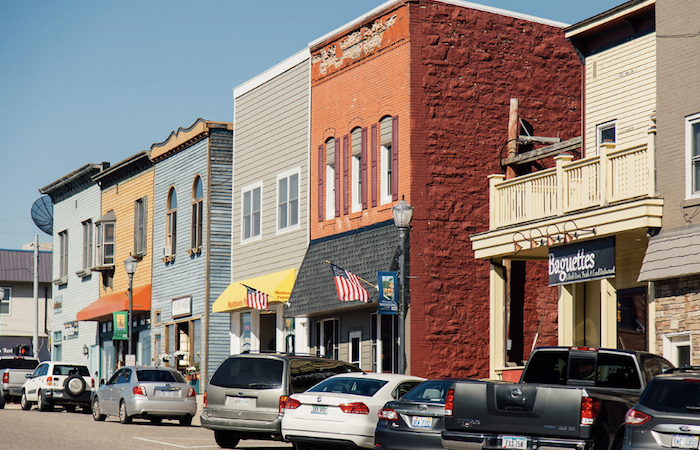
Tourism is considered a desirable industry, providing jobs and boosting economic activity. Recognizing that mining and forest resources were being depleted, UP residents founded the Upper Peninsula Development Board in 1911 to diversify economic activity.
Within a few years it published its first leaflet targeting tourism markets in Milwaukee, Chicago, and Minneapolis-St. Paul. From the outset, the region marketed its outdoors experiences to tourists. A hundred years later, that tradition continues.
One UP community that has achieved a degree of notoriety from tourism is Munising, the “Gateway to Pictured Rocks.”
Between 2010 and 2020, the number of park visitors increased from approximately 500,000 to 1.2 million, and their presence has greatly affected Munising.
In July 2018, The Detroit News characterized its development as “a tourist boomtown,” with local boosters identifying new businesses as one of the benefits of increased tourism. At the same time, some local residents complained that tourists were behind traffic increases, parking difficulties, and long lines at restaurants and supermarkets.
Community developers concede that for destination residents to accept tourism as a means of economic development they have to see tangible economic and social benefits from the activity, otherwise tourists are likely to be resented.
This article attempts to determine the tourist boom’s impact in Munising and Alger County over the 2010-2019 period by identifying major demographic and economic changes, using data from the Bureau of Labor Statistics, US Census’s American Community Survey, and the Michigan Department of Education.
Despite the increased number of visiting tourists, the number of people residing in Munising fell during the 2010-2019 period from an estimated 2,542 to 2,200 while the number of employed city residents dropped from 957 to 822.
At the same time, the number of persons employed in tourism-related activities–specifically entertainment, recreation, accommodation, and food services–increased from 117 to 193. By 2019, the largest share of the town’s employed population (23 percent) was employed in this sector, almost double from a decade earlier.
These same patterns are exhibited in Alger County. From 2010 to 2019, its population dropped from 9,604 to 9,151, with the number of employed persons falling by 267, while the number of persons employed in tourism-related activities increased, from 380 to 607. By 2019, tourism was the largest industry in the county, exceeding the number of persons employed in education and health care (514) and manufacturing (463).
The problem with jobs in the hospitality sector from an economic development perspective is that many are part-time, seasonal, and relatively low paying. Bureau of Labor Statistics data for 2019 indicate that the average weekly wage in Alger County for a person employed in the leisure and hospitality sector was $336, compared with $746 for all industries.
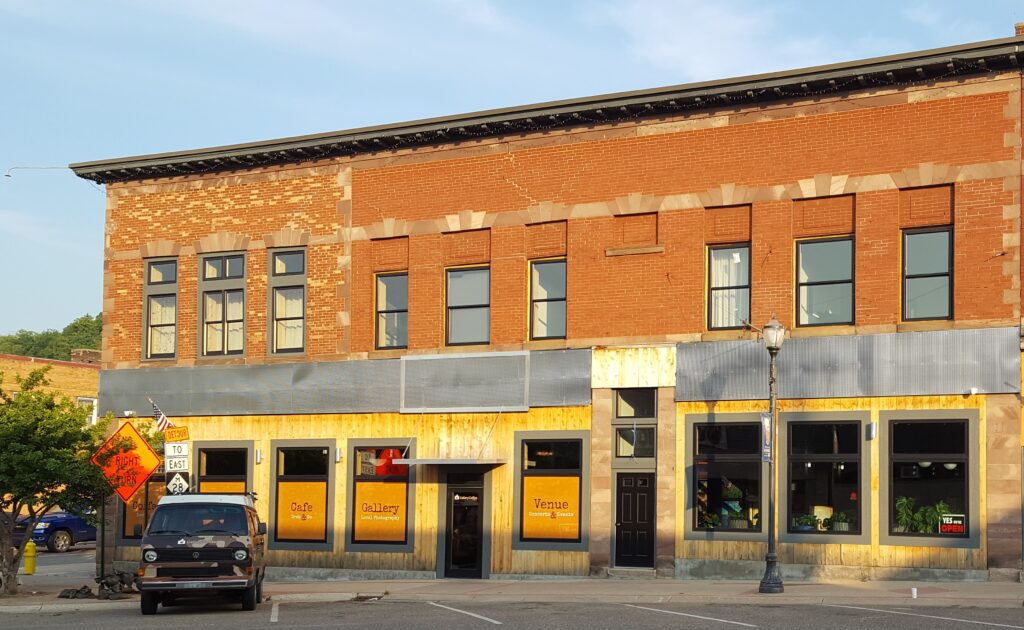
Gallery Coffee is one of downtown Munising’s recently-opened businesses. It occupies an 8,000 square foot renovated space at the corner of Elm and Superior Streets, and includes an art gallery and entertainment space.
The seasonality of Munising’s tourist season is reflected in Pictured Rocks’ tourist counts: in 2019, the number of monthly park visits ranged from a low of 5,772 in November to a high of 213,448 in August.
Indeed, 78 percent of total park visits occurred during the months of June, July, August and September. For some businesses this means closing once the tourist season is over, for others it means laying off staff, as there are fewer customers to serve.
The nature of tourism and its increasing importance to Munising is reflected by relatively modest increases in median household income (the median is the middle value of all household incomes ranked from highest to lowest).
In 2010, it was $34,650, and by 2019 it had reached $36,250–a gain of $1,600. By comparison, in the city of Norway–a similarly-sized and far less tourism-dependent UP community–the gain in household income during the same period was $6,500.
In the US, median household income is typically less than family income since households typically consist of either a young or older person, while families have two wage earners. This pattern is evident in Munising, where the gain in family income during the study period was $7,000, compared with Norway’s corresponding figure of $9,000.
Further evidence of tourism’s inability to boost the overall economy is found when examining the economic profiles of students in Munising Public Schools. In 2010, 301 students out of a total enrollment of 670 (44.59%) came from economically disadvantaged households, and by 2019 that figure rose to 346 students out of 646 (53.56%).
Estimates of families living below the poverty level in the city rose from 6.1% to 13.4% during the same period. These data indicate that while tourism is increasing in importance for Munising’s overall employment, these jobs appear ineffective at meaningfully boosting city residents’ incomes.
The increase in tourists has undoubtedly contributed to the success of some local businesses. Based on its recent growth, in 2021 Munising’s Uncle Ducky Outdoors was named as one of the “Michigan 50 Companies to Watch” by Michigan Celebrates Small Business.
In 2017, Tracey’s restaurant in the Roam Inn was voted best new restaurant in the state of Michigan by Buzzfeed and Yelp. Tourists have also created demands for other businesses, including a coffeehouse and two microbreweries.
Tourism’s growth has created additional demands for local housing. The city recently received a Community Development Block Grant to assist in the refurbishment of a downtown building for three new one-bedroom apartments, two of which would be for low-to-moderate income households.
Looking ahead, plans are being made for the Munising Market Place, “a three-story, mixed-use building that will house 38 mixed-income residential units and a collaborative workforce center designed to foster job creation and placement, serving area workers and businesses.”
Without tourism, Munising’s economic fortunes would be diminished, but given the nature of jobs in the hospitality sector–seasonal, low-paying and often part-time–it is asking a lot for this sector to boost the overall economic well-being of the city’s residents.
The trouble with tourism is: it’s complicated.



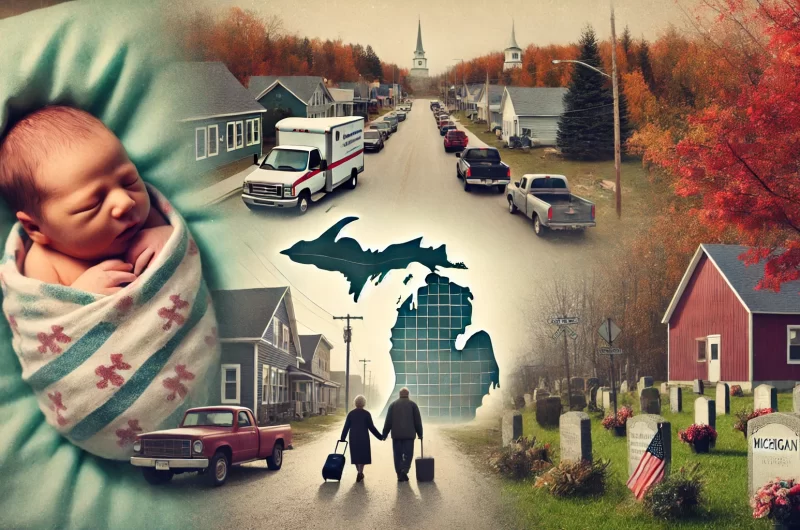
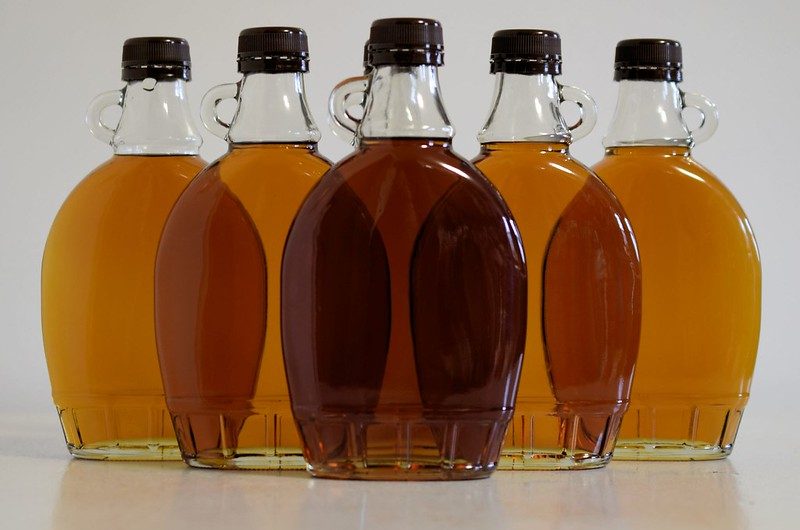
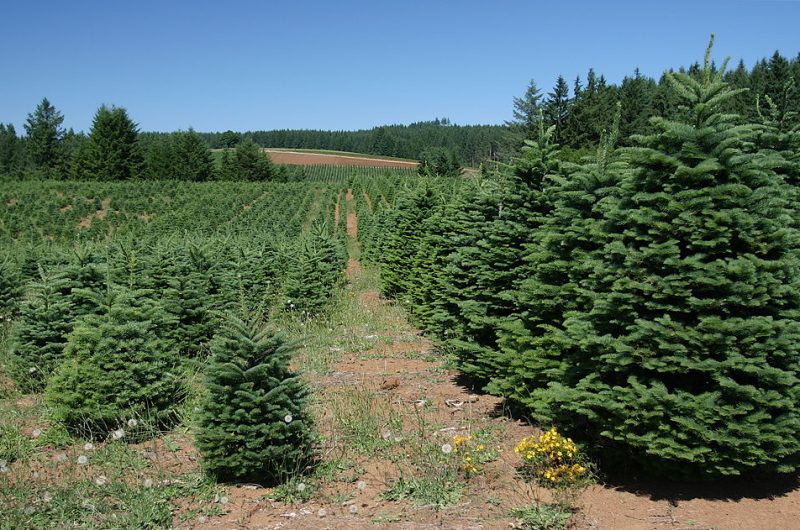

A studied and well written perspective. Timely and responsible. Great work!
Michael Omar’s remember to pray for a free United ireland. Ere pronounced Ara
Great article presenting the facts. Not really news to me. Bottom line, tourism as a whole does not really boost the overall income level of wage earners in a given tourism based city. It does certainly help some individual small businesses, whose owners often leave after tourist season to reside in warmer climates and that’s fine. This is true for many tourism based cities from Traverse City, go Gaylord to Munising. You need manufacturing to bring up the wages .
No that’s not what it meant. It meant that if there wasn’t tourism in the summer then there would be no jobs for others and they would end up having to move. But they need to be paid more yes. This was well written. Coming from a small town that also survives on tourism I completely get it. Because if we didn’t have it we wouldn’t be able to make it as a town.
You neglect to mention that Munising also has a big winter snowmobiling & cross-country ski season, due its more reliable snow cover than many other parts of the midwest. While this is still tourism, this ‘other busy season’ helps many places who keep the fires going through winter. Since your numbers are on an annual basis, they no doubt reflect winter as well.
I’m a local and just so you know Marc brink there’s barely any snow here anymore and all the restaurants close during the winter time it’s turning into a tourist town and that’s why alot of the locals move this town used to thrive off the winter time and not anymore it’s dead here we get a couple of snowmobilers but not like it was ten years ago
There’s too many tourists everywhere now since the pandemic started.
Way too many.
Especially Traverse City, Leelanau and Benzie counties!
I love yo hear how yhe winter tourism industry in Munising effects the local economy. This article focuses on summer, but muniaing is also know as the snowmobile capital of the world.
As a resident of Alger County, I stay away from Munising and the beautiful Lake Superior I use to love going to because of all the tourist. The beaches we once enjoyed are overpopulated, the campsites are full so people are camping where they should not be and leaving their trash. The enforcement is not happening because they don’t want to upset tourist. They have taken over Munising in the summer. Landlords have kicked out their long term renters to have their place available for short term renters (tourist). They can collect more from the tourist. Consequently, to find a place for local residents to rent is so scarce. Restaurants are overwhelmed so we have more food trucks. As the article stated, the residents are not benefiting from the tourist, it’s only the business’s. The residents give up their town in the summer without a choice. Sorry, but it all stems down to the almighty dollar!!!
Same in St. Ignace
The article doesn’t mention tips. If only measuring the typically low base pay in the service industry, it seems it would significantly understate seasonal economic impact.
As someone who has been visiting Munising for 30 years, I largely agree with you. I used to love going to Munising and enjoyed the peacefulness of the National Lakeshore, but I rarely go there anymore because it has been overrun by people who don’t care about the beauty of the area or the people who live there. Too many rude, inconsiderate people who leave areas worse than they found them. It is so sad.
your so right …. sheryl ……. i could not of said it better ~ kenny mcnally grand island chippewa native
Absolutely! I saw evidence supporting Sheryl’s position all day today. Other than my visit with you, Anne and Joni – it was nothing but rude people butting in from of me in line at Falling Rock, littering, beeping their horns etc.. The time has come for a local resident to become the NPS Pictured Rocks Superintendent!
I’ve seen both sides. I grew up in ironwood and visited last month to see a town in a 100 year decline. But I live in Gatlinburg, TN a town that had exploded since WW 2 due to massive tourist growth.
Ironwood shifted from mining to spotty tourism and saw an enormous decline in population. My graduating class in 1968 was 170. This year 37. IWD’s housing problem is what to do with all the vacant ones. In G’burg it’s lack of affordable units.
I grew up accepting that after college I’d have to leave to pursue a career. Here kids have to choose from either a low paying hospitality job, going into the real estate, education or health care or moving to look for manufacturing jobs that are declining overall.
A century ago ironwood attracted miners from Poland, Finland, Italy and elsewhere, who saw better opportunities than they had at home.
Here we attract workers from declining coal towns in Kentucky and from Central America who see more opportunities than they have at home.
We have horrendous traffic, sprawling growth, over crowded schools and a housing crunch but people still want to move here. We also have dirt-cheap taxes because of tourists paying sales and hospitality taxes.
So, as the writer concluded, it’s complicated. The jobs that built ironwood and Munising: lumber, mining etc are not coming back and if they did would not need the number or workers they once had. Is any economy better than none?
We’ve such a unique place here in the U.P. with our national and state forests, our many inland lakes and streams, and, of course, our incredible Great Lakes’ shorelines. What we’ve lacked is an economic base that could harmonize with all that makes the U.P. special. Extractive industries destroy bigtime, tourism overruns – so what would work? A few off the top of my head would be an expansion of health care and educational facilities, and bioregional planning for small-scale permaculture (lots of organic farms, orchards, dairy farms, grass-fed locally raised beef and buffalo) and small-scale processing facilities to support them (frozen french fries and tater tots, apple juice and cider, local dairies, etc.). Our forests and wild areas also need more protection from motorized boats and ORVs, from over-logging and over-development if we’re to maintain the variety of wildlife and peaceful way of life we love. Setting aside more of our land for protection under The Wilderness Act would also help! We’ve been “discovered,” and need to get our act together or end up like most other places that end up looking like run-on strip malls.
Part of the population decrease is due to locals leaving because Munising is overcrowded and crazy during the summer months. Traffic is terrible. What restaurants are open are overcrowded. Homes that are sold have been turned into VRBO’s and short term rentals. Quiet neighborhoods no more. Small town living is gone. Restaurants and motels are maximized. Tourism at what cost?
I live here and not anymore the restaurant all close we don’t get half as much snow as we used to.
Tourism is a trap! My cantankerous uncle said of the local Ore to Shore bike race – “The only change they bring (to the community) is a change of underwear”. Yes – it is complicated – as we lose well paid mining jobs (and support from labor unions – like to see a brave and needed story about the decline of labor in the U.P.)- the assumption is that community will have to survive on the tourism? Are there no other well or even decently paying industries out there??? And as the expected climate crisis drives rich tourists to buy in the U.P. – where will low paid locals live (who will be expected to “service” these new guests) Tourism breeds gentrification!! – how can you share the wonders of living in the UP in a sustainable, humane, “economically democratic” way?? A question that a lot of desirable communities are – urgently – asking?
[…] The conflict between the Trolls of Lower Michigan and the businesses in the Upper Peninsula has far-reaching consequences for small enterprises in northern Michigan. The heightened tensions have led to a decline in customer trust and loyalty, as local patrons become wary of supporting establishments embroiled in controversy. Additionally, the negative publicity stemming from these disputes has deterred tourists, a crucial revenue stream for many small businesses reliant on seasonal visitors. [9] […]